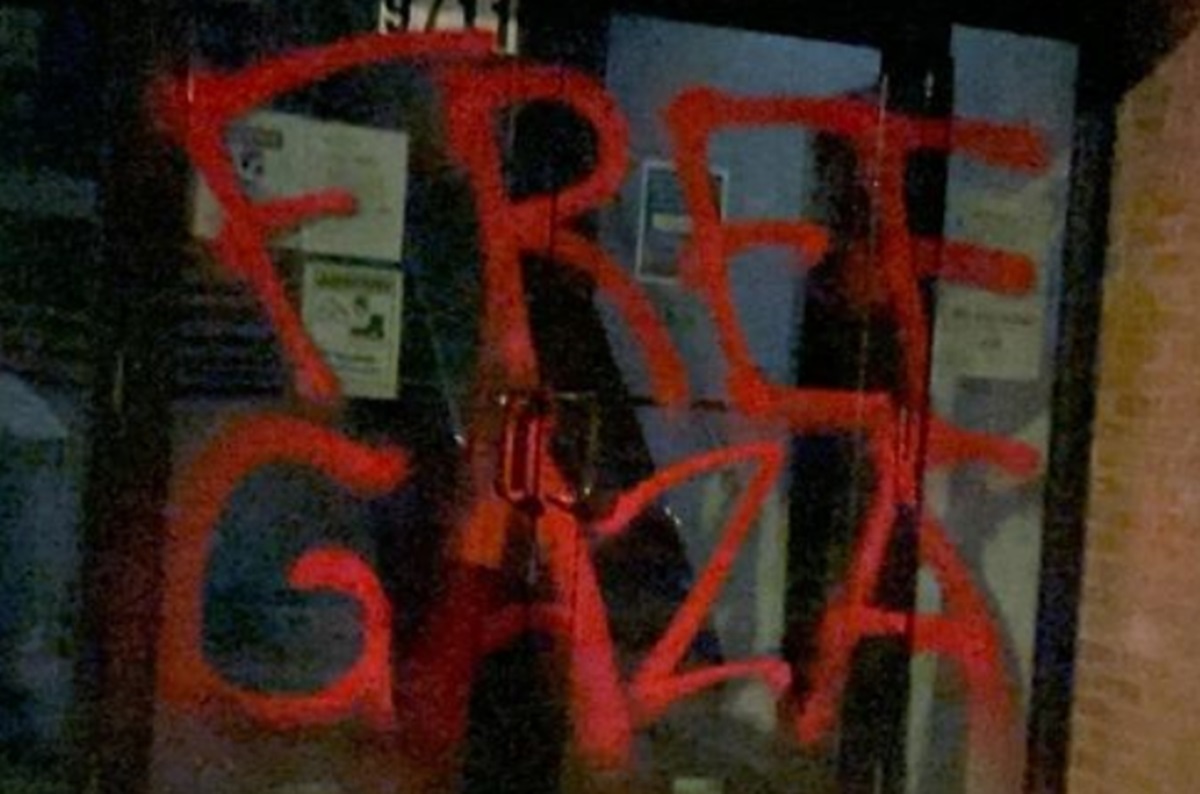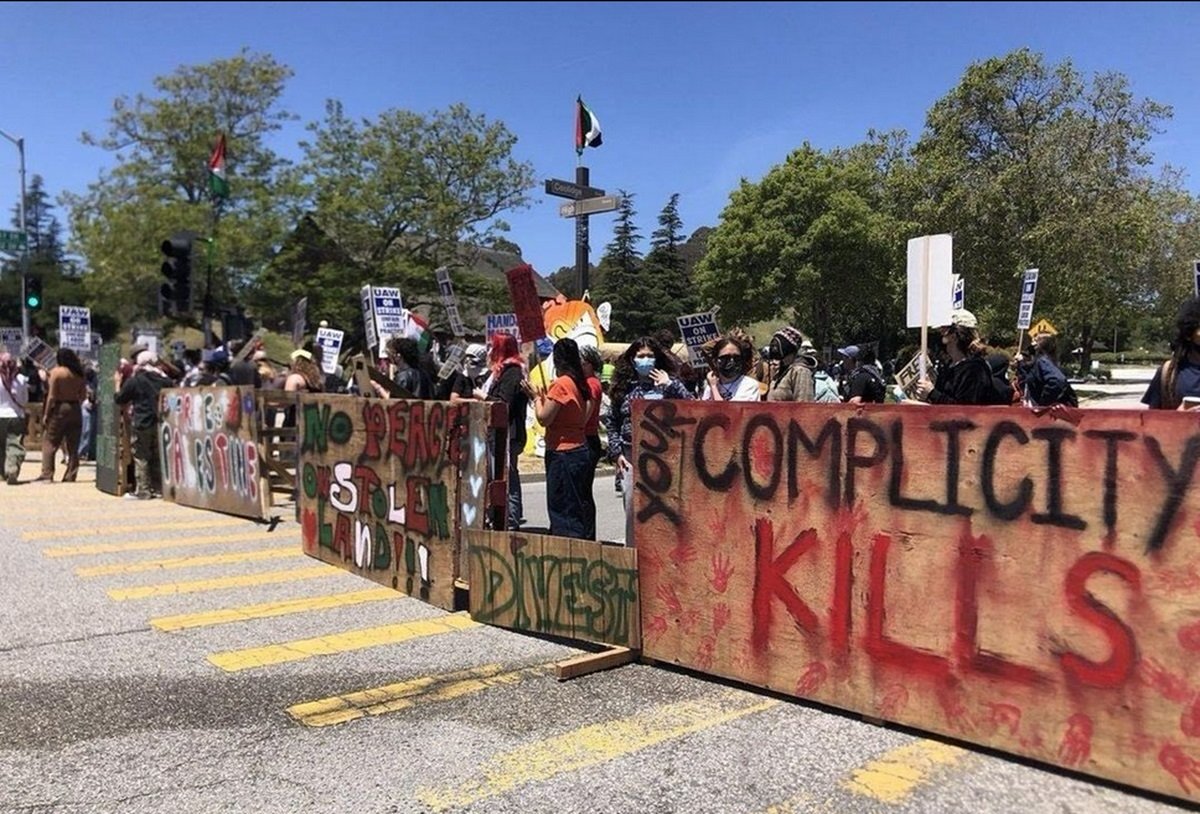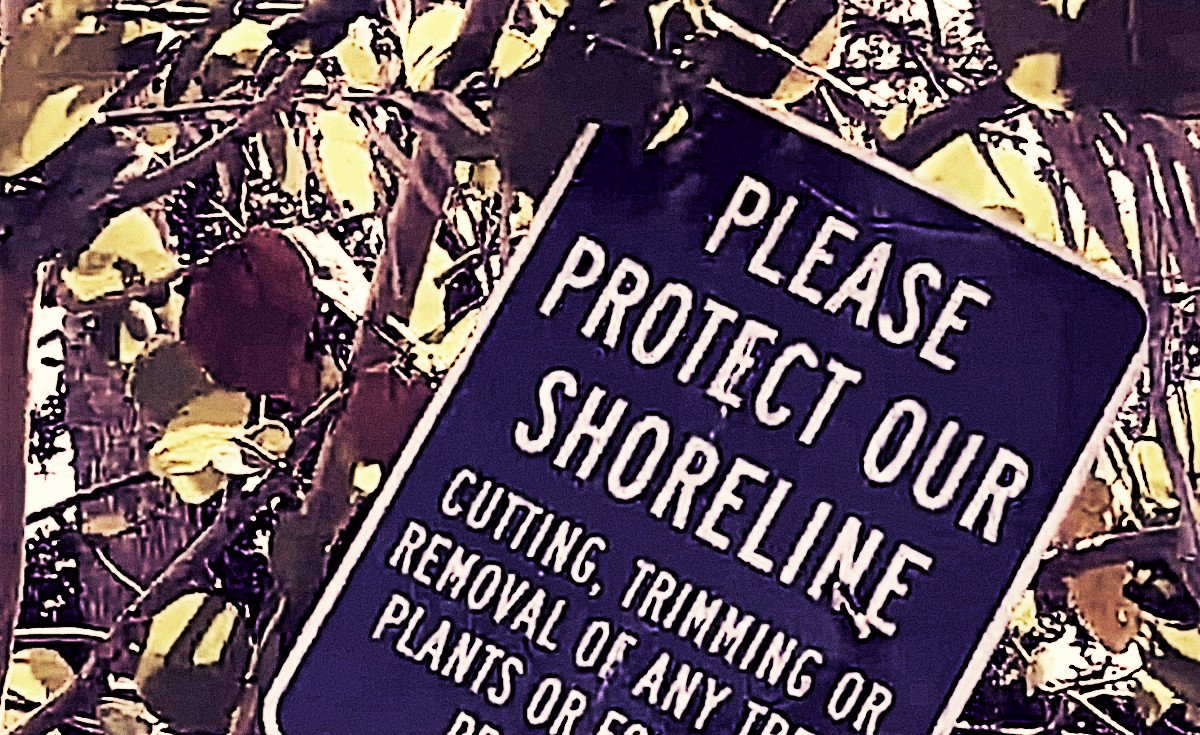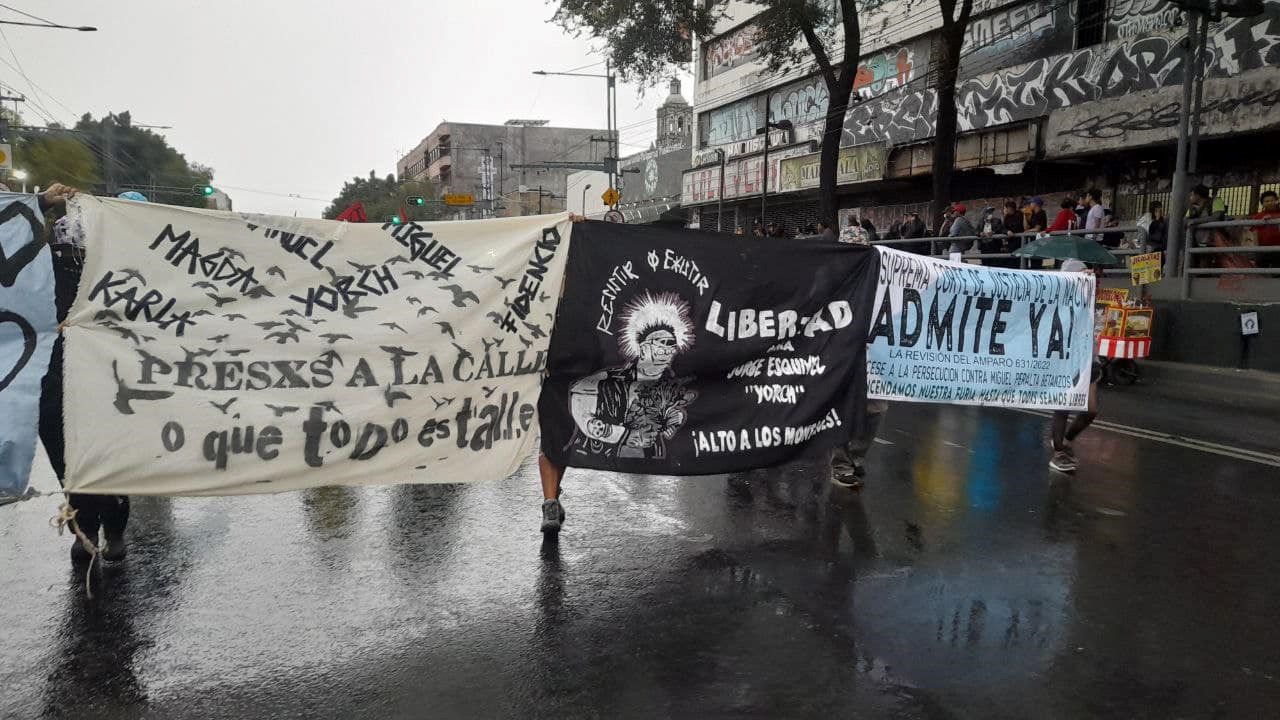Filed under: Action, Solidarity, Southwest, War
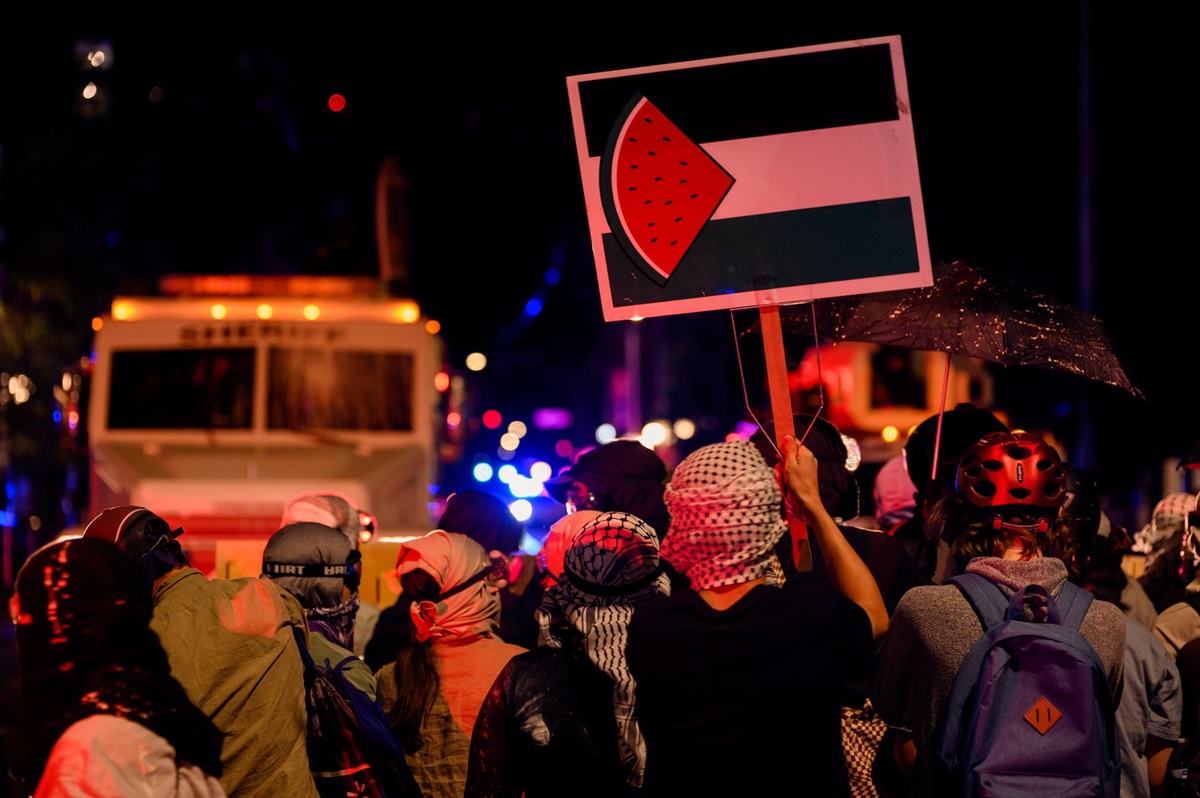
Report from so-called Tucson, AZ about ongoing action in solidarity with Palestine. Originally posted to Living and Fighting.
The first Battle for Tucson ended in victory for us when the cops trashed our encampment at the Olive Grove by the University of Arizona Main Gate on May 1. We escaped from campus after a four-hour standoff, supported by hundreds of comrades who held back a police charge in the street with linked arms. We suffered four arrests and a couple of rubber bullet wounds, at least one serious. See Living and Fighting for more on Tucson and my first report, also published in Hard Crackers.
“Audacity, still more audacity, audacity always!”
-Georges Danton, French Revolution 1792
“The best defense is disorder.”
–The Do-It-Yourself Occupation Guide
On May 9th, we returned to the Olive Grove and built another camp, where we did our best to be the world we wanted to be for about six hours. We knew they were gunning for us: by the end it was only a few dozen battle-prepped people defending the camp. We had two lines of barricades and retreated when they assailed us, at midnight, and pushed us west on University Boulevard from the corner with Park Avenue that forms Main Gate. We turned and faced the police across a block crowded with bystanders now saturated with tear gas—bright lights and that dark Tucson sky, chiaroscuro, drained of color under the palm trees. It was the night before UA graduation, and we were UA’s second Solidarity with Gaza encampment. Police shot pepper balls and rubber bullets. We retreated with dignity after a half-hour standoff, keeping most of us safe.
These weeks have been a school. We are learning in our bodies what has been only theory, understood at a distance. We are learning to act together and build a world. A few days of action are worth a year’s study (although study is precious). We have momentum—it’s not about negotiations, concessions, or reforms, it’s about pushing for Everything. This is a rehearsal.
We are speaking with our actions, refusing to be governed. We can be the future.
I went back for the second Battle for Tucson. A rally was called for 5:00 p.m. in Catalina Park, just west of campus. I attended the beginning of a meeting in the park for UA faculty and staff, who were striving to protect the student protesters. We were asked how high our tolerance was for risk. The plan was to get between the students and the cops. The organizers gave us ten minutes to turn to our neighbors and talk it out. My neighbor was an anthropologist, we chatted a bit.
This technique for getting active participation was new to me, and I love it especially for big meetings. Everyone gets space to think out loud, even the ones who tend to hold back. My friends also have a technique for voting in large groups by breaking into circles of five and then taking a tally after a quick discussion. This develops even shy people’s skills by letting us practice in small groups.
The organizers were beginning a training when I left for the rally: I’m 74 and in no shape for the defensive lineup. I sat under a flowering desert willow and listened to speeches across the lawn. Catalina Park is one square block, landscaped to eliminate private spaces.
I had agreed to speak and did so briefly. I stated my UA affiliation (visiting scholar in the history department) and said: “You’re beautiful! You are stronger than they are, stronger than you know when you move together! Be illegal, early on and often!” and not much else. (If I did this a lot I’d get better.) A faculty member from the School of Education announced he was proud of the students. Mohyeddin Abdulaziz from the Arizona Palestine Solidarity Alliance spoke about Palestine at length.
Then we walked, perhaps 300 of us as we left the park, resolute, with a marching drum. People joined us and waved, it was a sunny afternoon and not too hot. We turned down University Avenue and saw motorcycle cops a block ahead in the middle of the intersection, but they fell back, and back again, until we marched through Main Gate, onto campus, around the fountain and back to the Olive Grove. We returned!
We built a new encampment: tents, tarps, and pallets tied with zip ties. Snacks and heaps of small water bottles appeared. Someone announced, “Time to kick back and get to know your neighbor. Your presence matters.” There was training for medics. Someone started a song. I spoke with a couple of folks briefly. I was too tired to engage but I had to be there. I ate a protein bar and tried to rest. We were told not to litter but the pigs are going to bust us up anyway—why am I searching for a trashcan? But an orderly space is part of its allure. We had camping toilets.
There was a wild moment of premature confrontation when the police attempted to snatch someone and we got them back. (I dashed for the exit when it broke out.) We were not sealed in, we could come and go. We had folks on the other side of the low wall, holding signs, but not many. We missed the supportive crowd that had filled Park Avenue the week before. Cars honked support. There was a convocation right behind us at Centennial Hall, where they were forced to exit by the back door. There were grads and their parents everywhere, bros and girls in tiny clothing, a few homeless.
The university brought in a trailer-mounted flood light unit pulled by a golf cart and dozens of people surrounded it, kicked in the hood of the cart, stole road cones and boards to add to the barricades, and chanted “Pigs Out!” The contraption had legs to stabilize it and in the confusion someone detached one of them and spirited it away into the darkness of the encampment. The confrontation lasted for perhaps ten minutes before the cops retreated, taking their damaged equipment with them.
One of the lessons of occupations is how to use down-time. We’re in tight quarters, we can’t bring anything we don’t dare lose. I’m restless, so I left once to visit a hotel. I put my kaffiyeh away and wore lipstick, and slipped by the desk with a smile, pointing at the bathroom.
Some folks carried a couple of couches into the encampment. A lot of supplies came from dumpsters: this was end of the school year, the dumpsters were full. I sank down, then thought, My joints will freeze and when I need to move fast, I won’t be able to. The cops will charge while I’m dozing. That’s when I decided to go home. One of my crew appeared beside me and I said goodnight. (Thank you, you showed up both nights just when I needed to check out).
The cops moved in at midnight and drove us out of Main Gate and west on University to the next block. (I had left earlier and watched this on live stream, I’m using the collective pronoun). Faculty stood on the front line, holding signs that said, “Keep Students Safe,” and chanting, “Faculty are here to say, Shame on you, Go away!” (Two were later arrested some place away from the main action.)
The stand-off lasted maybe half an hour. The cops could have pushed us north or south into an empty street. Instead, they drove us into a crowded pedestrian area the night before commencement, packed with bars, restaurants, grads and their parents, partying jocks. We think they counted on the bros to beat us down, remembering the line of drunken frat boys on April 30th. We suffered only a couple of arrests, again a couple of injuries. I found police behavior bewildering and asked my comrades, “Are we that good or are they that bad?” They said, “Both.”
Did the cops think about how many people would be hit by tear gas? (It would be interesting to see legal discovery. Or any impacts on asthmatics, for example, out for a late stroll that night). I saw bros taunting us and a few skirmishes but nothing out of control. I think the frat boys were taken aback by our battle gear—helmets, shields, reinforced signs—and by women and trans folk fighting. It was a standoff, we threw canisters back at the pigs and kept up our drumbeat and shouting: “We keep us safe!” “Palestine will be free!” There was gas everywhere. Our comrade doing the live feed got gassed and kept filming. We finally fell back around 12:30 a.m.
I’d been reluctant to go but too tired to stay in a volatile situation. There had been a direct action training that morning, focused on high-speed costume switches to thwart surveillance. I learned to make a mask from a t-shirt. At the encampment, I changed my head gear and top twice. Leaving, I switched again, put my backpack into a tote bag and shook out my hair. I wore a pastel zip-up hoodie and looked like a suburban granny. I had a long walk to my car.
I went back to the house where I was staying and hung out with our comrade who got a purple heart last week for being shot with a rubber bullet to the knee. We drank wine and dozed on our couches, then found a live feed to watch, then dozed some more. Folks got home around 1:00 a.m., jubilant but stinking of tear gas. They showered off outside. One of them was hit in the torso with pepper balls. They reported someone with a broken collar bone from stumbling through the chaos and falling, and someone hit on the head with a tear gas cannister.
Some friends came by and said they’d been supporting folks who’d been blinded by tear gas while heading for their cars. A bully on the sidewalk was filming them with his phone and snickering—our friend slapped the phone out of his hand and cursed him. He was astonished.
On graduation night, friends projected a series of poetic fragments on the wall of the city court building downtown at nightfall: “Palestine illuminates the colonial nature of the rest of the world. – Noura Erekat,” “There will be no flowers to lay as they too will have died. No palms on graves, and no graves either. – Heba Al-Agha,” and “I keep the dead in my head like knives in a block. – Benjamin Krusling.”
People papered every car in the garage near commencement with a flier accusing Raytheon of war crimes: “U of A you can’t hide: Here’s proof of your genocide,” and a list of investments tied to Israel. We heard that two people were arrested and charged with trespassing at the garage.
I can’t believe I’m part of a movement where you can fight the cops one day and be offered herbal remedies and tattoos the next. (A Palestinian flag on the neck for me.) The day after there was “an abundant schedule for fun/chill/sweet/restful/caring thangs!”: a pool party, a nervous system workshop, a healing support drop-in, and a writing group which was oversubscribed. Two days later, I drove home to Bisbee but stayed on my Signal channel, where folks are still decompressing, debriefing, and beginning to make new plans. There was a request for tips on getting tear gas out of car seats. (Change the air filter and borrow a vac). There was a bid for a die-in as our next direct action, since the comrade was too tired to march and shout but would gladly lie down. I harvested a crop of mullein to bring next time: good for lungs damaged by tear gas, grows in my yard.
Last week I found The Do-It-Yourself Occupation Guide at the first encampment. The authors offer practical advice for building takeovers, etc., from bolt-cutters and angle-grinders to how to wear glasses under goggles. They offer social advice as well: occupations are more than expressions of rage, they are opportunities to live and fight together.
Leaving town, I saw a friend. While I was bubbling with excitement that I wanted to share, they told me they had no hope, as if that were a gift. I used to call myself a soldier from a defeated army. But I—we—have hope.
The time is now.
“Everything or nothing. All of us or none.
One alone our lot can’t better,
Choose the gun or fetter.
Everything or nothing. All of us or none.”
-Bertolt Brecht, Svenborg Poems
photo: APSA Media Collective


